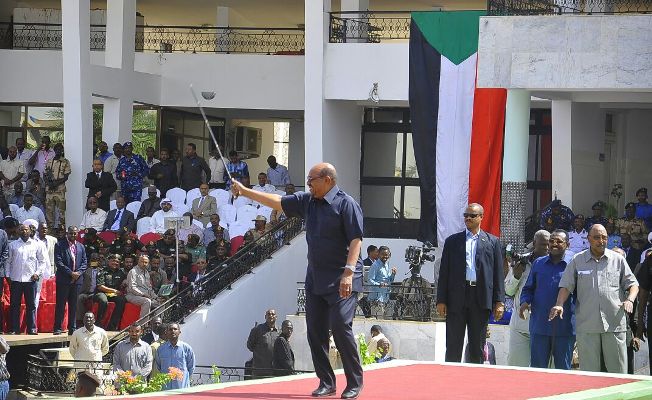SPLM-N fighters won’t be integrated into the Sudanese army: Bashir

November 15, 2016 (KHARTOUM) – Sudanese President Omer al-Bashir said any peace deal with the Sudan People’s Liberation Movement-North (SPLM-N) would not include the integration of the rebel combatants in the Sudanese regular forces.
Bashir, who was addressing the forces of the Sudanese Military Intelligence, on Sunday, vowed to restore security to the South Kordofan and Blue Nile state next summer “either through peace or war “, stressing “We want to secure the Sudan, protect all our borders and to clear it from any outlaw.”
In a leaked audio recording of his speech in the closed-door meeting, the President stressed that the SPLM-N has missed the opportunity.
“In the past, we used to negotiate a (peace) agreement including security arrangements and disarmament, demobilization and reintegration (DDR) process accordingly they are absorbed in the army, the police and security service, but as of today no single outlaw will be absorbed,” he said.
The Sudanese president pointed out that the SPLM-N forces in South Kordofan and Blue Nile states are part of South Sudan’s SPLA army.
“They were supposed to give them (SLPA-N fighters) their rights and the latter had to hand over their weapons before to return to Sudan. But they didn’t do that in order to negotiate with us,” he said, referring to the Comprehensive Peace Agreement of 2005.
Al-Bashir however said every SPLA-N fighter who renders his weapon or vehicle will receive a compensation and be appointed in a job through the DDR Commission.
South Sudan seceded from Sudan on July 9th 2011 following a referendum on whether the semi-autonomous region should remain a part of the country or become independent. 99% of the southern voters chose independence.
The former SPLA (southern guerrilla army) 9th and 10th divisions in South Kordofan and Blue Nile formed the SPLM-N in the run-up to South Sudan’s secession and have been fighting the Sudanese army in the two areas since 2011.
Al-Bashir added the SPLM-N should have changed its name to the “southern sector” because they are actually part of South Sudan’s army, saying the rebel movement is now present in the south of the new Sudan, Blue Nile and South Kordofan.
Commenting on Sudan’s relations with South Sudan, al-Bashir said they are ready for peace or war with the newborn nation.
“If they want peace, they are welcome as brothers and if they don’t want peace we are ready [for war] and he who refuse reconciliation will come to regret it,” he said.
He pointed that several unnamed powers had worked to separate the south in order to deprive the north of the oil and establish a powerful state to destroy Sudan, saying however their plot had failed and now they are appealing to Khartoum to achieve peace in South Sudan.
DARFUR REBELS TO BE TREATED DIFFERENTLY
Meanwhile, al-Bashir vowed to deal with Darfur rebels differently and directed his Defence Minister Awad Ibn Ouf to look into ways to integrate their fighters in the Sudanese regular forces if they choose to join the peace process.
He asked Darfur groups to resort to peace as soon as possible, warning that they would force them to chose peace if they refused to lay down their arms.
It is noteworthy that the Sudanese army on 12 April declared Darfur a region free of rebellion following the capture of Srounq area, the last Sudan Liberation Movement (SLM-AW) led by Abdel-Wahid al-Nur stronghold in Jebel Marra.
Earlier in August, the African Union High Level Implementation Panel (AUHIP) suspended peace talks on Darfur region, South Kordofan and Blue Nile states after the parties failed to agree on security arrangements and humanitarian access.
Several international, regional and local parties seek to resume talks as soon as possible in order to agree on the cessation of hostilities paving the road for a comprehensive settlement to end the war.
The Sudanese army has been fighting the SPLM-N rebels in Blue Nile and South Kordofan since 2011 and a group of armed movements in Darfur since 2003.
(ST)
